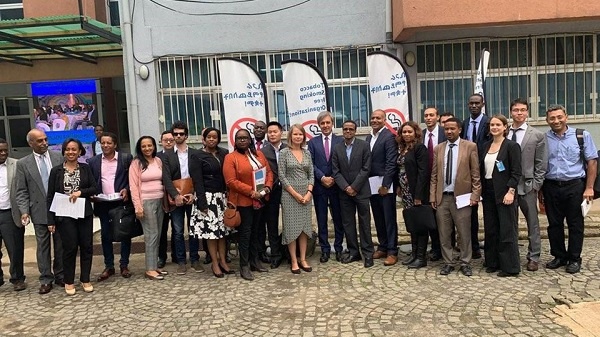
Ethiopia’s Minister of Health challenged the Health Innovation Exchange to work with the country to identify a variety of potential solutions to its priorities and to facilitate connections across the government and local partners.
ADDIS ABABA (UNAIDS) – Ethiopians traveling to seek medical care outside the country cost the Ethiopian economy US$ 250 million per year. Around 40% of Ethiopia’s health centers have no electricity and 50% are without access to clean water. But despite these challenges, Ethiopia is striving to improve its health-care system so that it can meet the needs of all its citizens, in line with the global commitment made at the United Nations General Assembly High-Level Meeting on Universal Health Coverage on 23 September 2019 to achieve universal health coverage by 2030.
Ethiopia has taken an innovative approach to managing priorities and is setting ambitious targets. Finding new technologies and innovations for the health, energy and other sectors is critical.
The government will launch a program in October that will see 10 ministries work together to define and address priorities on a district-by-district level. This will require partnership across the private sector, communities and international development partners. The Ethiopian Minister of Health, Amir Aman, is committed to making a change by working with the Joint United Nations Programme on HIV and AIDS (UNAIDS) and other international partners to identify and apply the right innovations.
“I appreciate the commitment of UNAIDS and the Health Innovation Exchange to support Ethiopia in the use of innovation, especially for tuberculosis, HIV, hepatitis B diagnosis, the use of solar panels for health facilities and incorporating artificial intelligence to fast-track access to health-care services, as well as facilitating local production of medicine and medical supplies,” said Dr. Aman.
This partnership with UNAIDS was sparked when Dr. Aman visited the innovation exhibition at the launch of the UNAIDS-led Health Innovation Exchange platform in Geneva, Switzerland, in May. The Health Innovation Exchange is a platform led and founded by UNAIDS that identifies the challenges faced by health providers and connects them with high-impact innovations. It also links with investors to scale up innovations and develop sustainable solutions.
Dr. Aman challenged the Health Innovation Exchange to work with the country to identify a variety of potential solutions to its priorities and to facilitate connections across the government and local partners. UNAIDS brought together a delegation of innovators and investors in Ethiopia from 3 to 6 September to explore opportunities for integrating innovative solutions and technologies for health into the country’s development efforts. The delegation included innovators and companies that brought solutions in various areas, such as HIV and tuberculosis diagnostics, solar energy for health-care settings, artificial intelligence for diagnostics and research, pharmaceutical manufacturing and needle safety in hospitals, as well as blended education models to build the Ethiopian health workforce.
The solar energy solutions proposed by members of the Health Innovation Exchange delegation were welcomed, as access to efficient modern energy is a critical enabler for essential maternal and newborn health services. Without energy, many life-saving maternal health services cannot be utilized effectively, which poses critical barriers to reaching the maternal mortality targets and other heath targets of the Sustainable Development Goals.
“Through UNAIDS’ facilitation, we have made direct connections with key ministers and decision-makers in Ethiopia. We have been able to map out a way ahead in bringing technology with potential for impact to Ethiopia and the African market. We are committed to making a difference and appreciate the energy and leadership of the Ethiopian Government in driving such unprecedented change,” said Mauro Pantaleo, Chief Executive Officer, P&P Patents and Technologies.
Meeting with the delegation, Dr. Aman committed to supporting the integration of a number of the proposed solutions into the country’s programs, ensuring that policies and processes will support the new private sector partners working with the country.
Source: UNAIDS
